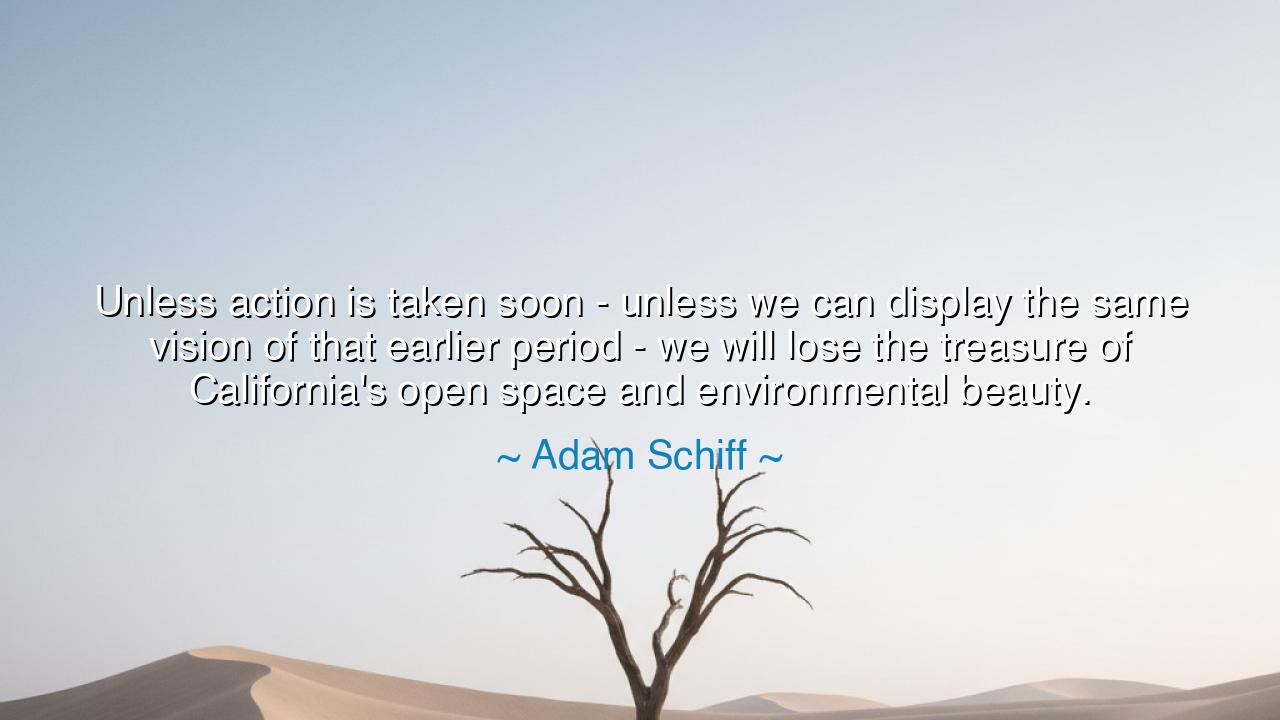
Unless action is taken soon - unless we can display the same
Unless action is taken soon - unless we can display the same vision of that earlier period - we will lose the treasure of California's open space and environmental beauty.






Hear the sounding of the horn upon the western rim: “Unless action is taken soon—unless we can display the same vision of that earlier period—we will lose the treasure of California’s open space and environmental beauty.” In these words the watchman on the wall calls to the towns within: awaken, for the fields beyond your gates are not mere scenery but inheritance. What is praised here is not nostalgia, but remembrance with teeth—the courage to do again what was once bravely done, lest the living tapestry of shore, valley, and mountain unravel into dust and deed.
In ages past, the elders of the West bound themselves to a stern joy: to keep what could not be remade. Their vision became law and trailhead; their action became refuge and reserve. They understood that open space is a nation’s lungs, and environmental beauty a people’s psalm. To speak of treasure is to speak not only of gold in vaults but of light on granite, wind in chaparral, hawks wheeling over oak savanna—wealth that cannot be minted, only guarded. The sentence is set like a scale: on one pan, speed and appetite; on the other, restraint and foresight. Only the latter has ever preserved a home.
Consider the true tale of three women who stood by a great bay: Kay Kerr, Sylvia McLaughlin, and Esther Gulick. In the 1960s, when San Francisco Bay was being filled and pinched for profit, they founded a humble band—Save the Bay—and turned household tables into planning councils. Letters became laws; kitchen talk became covenant. Their action summoned a vision larger than any map, and the tide of destruction reversed: wetlands restored, public access won, a culture of care planted along the water’s edge. From a few voices rose a chorus; from a chorus, a commission; from a commission, a future. Thus the earlier period to which we are urged to look is not a dream but a record.
We might also recall the battle for Mono Lake, where streams once destined for distant faucets were returned, by judgment and persistence, to the thirsty basin that birthed them. There, the doctrine of the public trust was not a scholar’s whisper but a shepherd’s staff, turning a city’s reach back from a shoreline of tufa and snow-fed brine. Again the pattern: speak for what cannot speak; measure plenty as what remains for tomorrow; bind will to wisdom. Such stories do not flatter us; they draft us. They declare that California was not given—it was chosen, again and again, by those who took the hard road of keeping.
The warning is therefore double-edged. First, time is a river running faster than our debates: soon is a cliff whose lip we cannot see while quarreling. Second, memory without action is a museum; vision without structure is a mist. To preserve open space and environmental beauty, we must set our hands to the instruments of stewardship—zoning that guards corridors for wildness, easements that secure working lands, budgets that pay rangers and restore creeks, covenants that outlast elections. Beauty does not survive on compliments; it survives on contracts.
What lesson shall we send forward to our children and their children? That love is proven by limits. To bequeath them more than ledgers of debt, we must bequeath them ledgers of living things: salmon that still know their way home, redwoods that still trade fog for sunlight, trails where a city-sick heart can find its pulse again. Let our vision be measurable, our action visible, our treasure countable in acres unpaved and horizons unbroken. The earlier period was not an age of giants but of joiners—ordinary people who decided that inheritance is carved from habit.
Take up these simple, stern practices: (1) Give your local land trusts time and tithe—help them buy the meadow before the bulldozer does. (2) Vote for bonds that restore rivers, fortify forests, and open parks to those who have been kept at the fence. (3) Walk where you mean to save—once a month, with friends, with gloves; pick, plant, learn the names of things. (4) Insist that new roofs and roads pay their true costs—water captured, trees replanted, shade returned. (5) Teach a child to read a hillside the way one reads a book, and a shoreline the way one reads a face—so they will know what is missing if it goes. Do these, and the song within Schiff’s warning will become your own: that through action wedded to vision, the treasure of California’s open space and environmental beauty will not diminish under your watch, but deepen.






AAdministratorAdministrator
Welcome, honored guests. Please leave a comment, we will respond soon